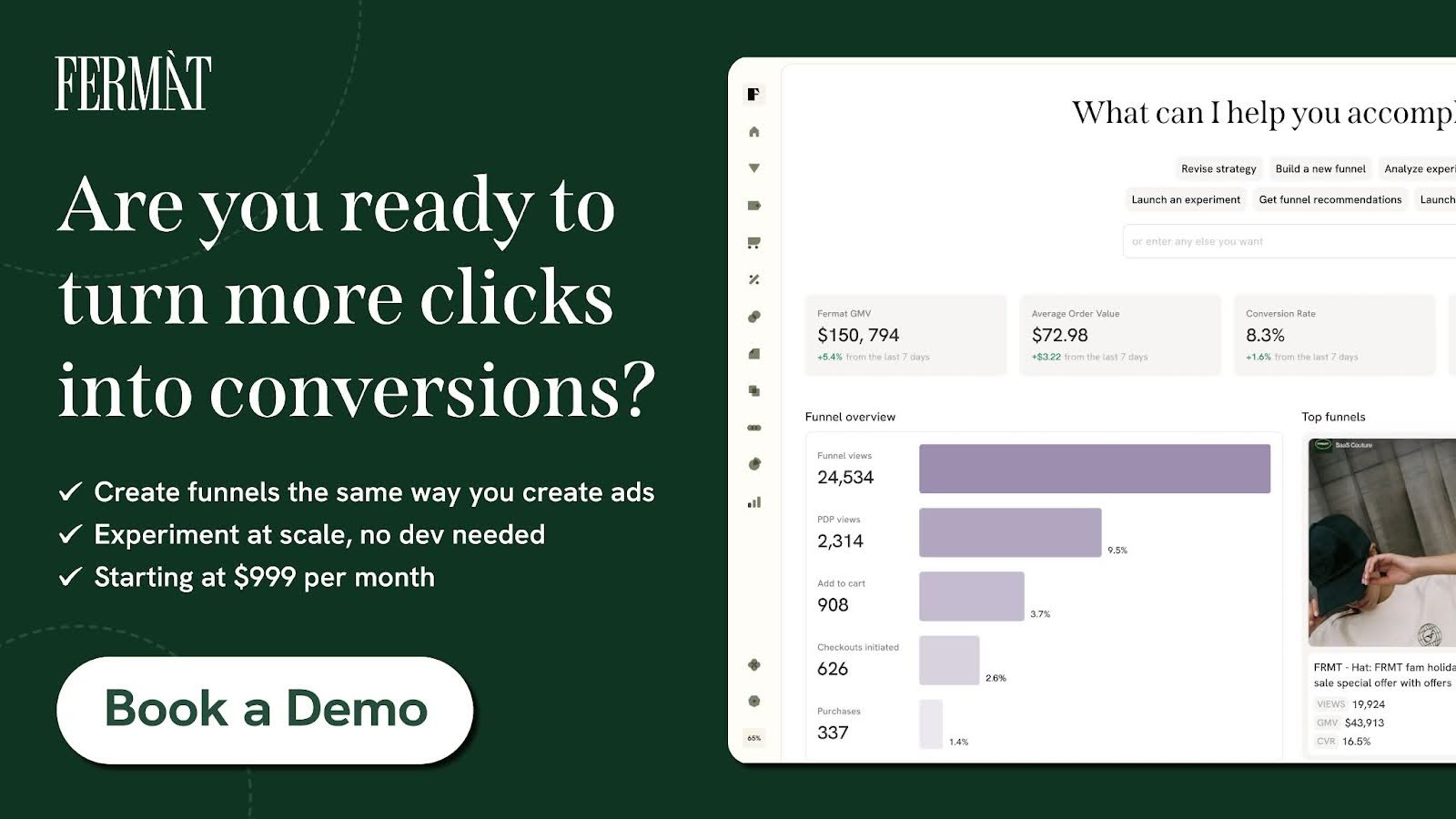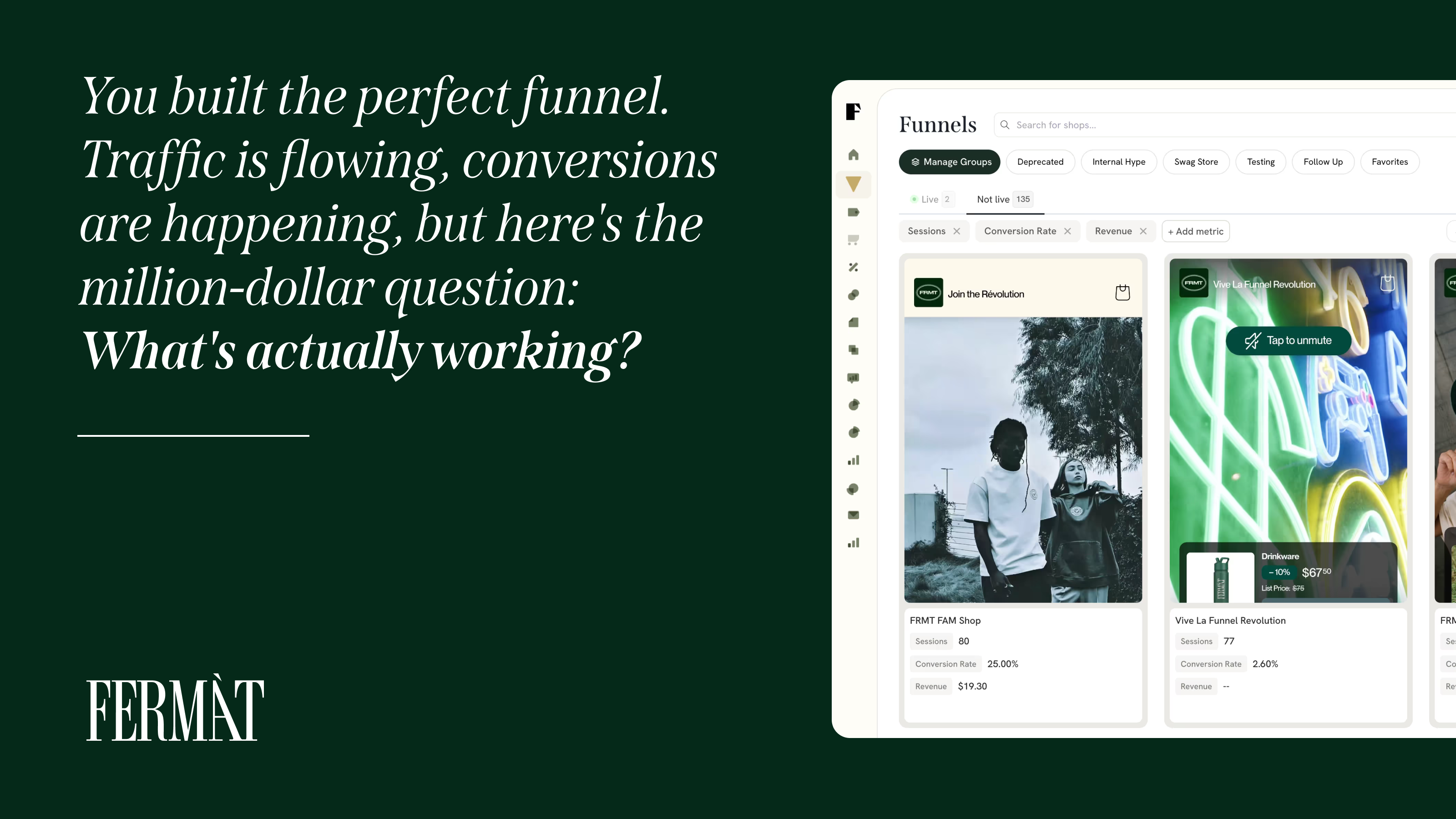
How To Set The Perfect Free Shipping Threshold To Boost Average Order Value
Boost AOV with the perfect free shipping threshold. Find out how to optimize strategy, test offers, and drive conversions with FERMÀT’s smart tools.
Key Takeaways:
- Smart Threshold Calculation: Discover the exact method to calculate a profitable free shipping threshold that encourages customers to spend more.
- Data-Driven Optimization: Learn how A/B testing and CRO strategies can fine-tune your threshold for maximum conversion impact.
- FERMÀT-Powered Performance: Find out how FERMÀT’s tools and insights make it easier to optimize shipping offers without sacrificing margins.
At FERMÀT, we’re reshaping ecommerce with personalized, shopper-aware experiences that drive real results. Our platform doesn’t just help brands convert—it helps them understand why shoppers convert, empowering them with intelligent, real-time data to increase revenue across every channel. From dynamic merchandising to advanced A/B testing, we’ve helped some of the most forward-thinking ecommerce brands unlock growth through smarter on-site optimization.
When it comes to performance levers that move the needle, free shipping remains one of the most underrated. Customers love it. But brands often hesitate, unsure how to offer free shipping without sacrificing margins. The solution isn’t to offer free shipping to everyone—it’s to offer it strategically. That’s where the free shipping threshold comes in. Set too low, and it becomes a loss. Set too high, and it loses its power. The challenge—and opportunity—is finding the exact number that nudges customers to spend more, without giving away too much.
In this piece, we’ll show you how to set the perfect free shipping threshold to boost average order value—along with data-backed strategies to test, optimize, and scale it using FERMÀT’s conversion tools.
Why Free Shipping Matters In Ecommerce
Free shipping isn't just a perk—it's a powerful conversion driver. In an increasingly competitive ecommerce landscape, customers expect convenience, speed, and value. Free shipping checks all those boxes. According to industry research, unexpected shipping costs are one of the top reasons for cart abandonment. When shoppers see additional fees at checkout, they often leave without completing the purchase.
Offering free shipping can directly influence buying behavior. It reduces friction at the final stage of the conversion funnel and creates a stronger incentive for shoppers to finalize their orders. It also builds trust and increases customer satisfaction, especially when it feels like they're getting something for "free" without hidden costs.
But there’s a catch: offering free shipping across the board can eat into margins. That’s why setting the right free shipping threshold is crucial—it allows you to provide an incentive without sacrificing profitability.

What Is A Free Shipping Threshold?
A free shipping threshold is the minimum order value a customer must reach to qualify for free shipping. For example, if your threshold is $50, customers must add at least $50 worth of products to their cart to unlock the benefit.
This tactic serves two major purposes. First, it encourages shoppers to spend more in order to avoid shipping costs. Second, it gives merchants control over when and how they absorb shipping expenses, ensuring it aligns with their business goals.
Think of the free shipping threshold as a psychological nudge. Customers may not have planned to spend $50—but if they're close, they'll often add another item rather than pay $7.95 for shipping. When used strategically, this simple threshold can have a powerful impact on your average order value (AOV).
Why The Right Threshold Boosts Average Order Value
Setting the right free shipping threshold doesn’t just eliminate a barrier—it actively influences purchase behavior. When customers are just a few dollars away from unlocking free shipping, they’re more likely to add another product to their cart. This small nudge often results in a measurable lift in average order value.
But it’s not just about the numbers—it’s about intent. When a customer adjusts their order to meet a threshold, they’re more engaged with your store. They might discover new products, browse longer, and build a deeper connection with your brand. All of this contributes to better long-term customer value.
However, the threshold must be set strategically. If it’s too high, it feels unreachable and discouraging. Too low, and you might give away margin unnecessarily. Finding that “sweet spot” is essential for balancing customer motivation and profitability.
How To Calculate The Ideal Free Shipping Threshold
There’s no one-size-fits-all number for a free shipping threshold—it should be tailored to your business model, costs, and customer behavior. But here’s a practical way to calculate a threshold that drives results without eroding your margins.
Step 1: Analyze Your Average Order Value
Start by calculating your current average order value (AOV). This is your benchmark. Your free shipping threshold should typically be 10–30% higher than your AOV, depending on your margins and goals.
Step 2: Factor In Shipping Costs
Know your average shipping cost per order. Then determine what portion of that cost you're willing to absorb. You may decide to offset it entirely, or only partially, using product markup or increased volume.
Step 3: Consider Product Margins
Low-margin businesses need to be more cautious. Make sure that any increase in order size will still be profitable after absorbing the shipping cost.
Step 4: Test And Refine
Once you’ve landed on a starting point, test it. Run an A/B test comparing different thresholds to see how they impact conversion rates and AOV. Data will guide you toward the optimal number.
Free Shipping Strategy: Tips For Success
A well-crafted free shipping strategy does more than just boost order size—it enhances your entire shopping experience. Here are some key tips to make your strategy work smarter:
Align With Your Brand And Margins
Free shipping should feel like a natural extension of your brand—not a gimmick. Luxury brands might offer free shipping as part of a premium experience, while budget-friendly stores may tie it to larger orders to stay profitable.
Use It As A Promotional Tool
Free shipping doesn’t have to be static. You can offer it during specific campaigns (e.g. holidays, new launches, slow seasons) to drive urgency and re-engage shoppers.
Make The Threshold Clear
Display your free shipping threshold prominently on product pages, in the cart, and during checkout. Help shoppers know how close they are to qualifying—it encourages them to add more.

Offer Free Shipping On Select Products Or Categories
If offering free shipping across the board isn’t viable, consider applying it only to high-margin products or categories. It still provides value while protecting your bottom line.
Combine With Other CRO Tactics
Pair your free shipping offer with proven tactics from your Shopify CRO playbook—like personalized upsells, smart bundling, and urgency messaging.
A/B Testing And Optimization For Free Shipping Offers
Even a well-informed guess needs validation—and that’s where A/B testing comes in. Optimizing your free shipping threshold is not about setting it once and hoping for the best. It’s about continuously experimenting to find what actually drives conversions and increases revenue.
Test Different Thresholds
Start by testing two or more thresholds (e.g., $50 vs. $60) and measure which one yields higher average order value and better conversion rates. What works for one audience or product mix might not work for another.
Evaluate The Impact On Profitability
Higher order values are great—but not if they’re killing your margins. As you test, factor in shipping costs, product margins, and overall profitability.
Monitor Cart Behavior
Use tools to analyze where customers drop off. If you set a threshold at $75 and most carts hover around $70, that’s a signal you may need to tweak the offer or provide better upsell incentives.
Iterate And Scale
Once you’ve identified a winning formula, roll it out site-wide, or run seasonal variations. Optimization is a constant process. Leverage A/B testing to refine not just the threshold, but also the way you present and promote the offer.
How FERMÀT Helps You Nail Your Free Shipping Strategy
At FERMÀT, we don’t just help you implement a free shipping strategy—we help you optimize it for real results. Whether you're using Shopify or another ecommerce platform, our tools and insights make it easier to increase average order value, drive conversions, and protect your margins.
Personalized Threshold Testing
With FERMÀT, you can run precise A/B tests to identify the best-performing free shipping threshold for your audience. We make it easy to segment traffic, test multiple variants, and interpret results—all without slowing down your team.
Data-Driven CRO Enhancements
Our Shopify CRO solutions include intelligent upsell strategies, behavioral triggers, and UI enhancements that align perfectly with your shipping incentives—helping you push shoppers closer to the threshold naturally.
Smarter Conversion Funnels
A well-designed conversion funnel is essential when offering free shipping. FERMÀT helps you align your entire funnel—from product discovery to checkout—with your shipping offers, ensuring that each stage supports your goal of higher-value purchases.
Continuous Optimization
We know that ecommerce isn’t static. That’s why we provide ongoing support and performance insights, helping you fine-tune your strategy month after month.

Final Thoughts
A well-calculated free shipping threshold is more than just a marketing tactic—it’s a strategic lever for boosting your average order value and overall profitability. When done right, it enhances the customer experience, reduces cart abandonment, and motivates shoppers to engage more deeply with your store.
But guessing won’t get you there. You need data, testing, and a system that evolves with your business.
That’s where FERMÀT comes in. From smart A/B testing to full-funnel CRO tools, we help you design and optimize a free shipping strategy that truly pays off, both for your customers and your bottom line.
Frequently Asked Questions About The Perfect Free Shipping Threshold To Boost Order Value
What industries benefit most from setting a free shipping threshold?
Any product-based ecommerce business can benefit, but it's especially effective in apparel, beauty, home goods, and electronics—where customers often buy multiple items or build custom carts. Subscription and DTC brands also see strong ROI from free shipping thresholds.
Is free shipping better than offering a discount?
It depends on your audience. Many studies show that customers perceive free shipping as more valuable than a small discount. It removes friction rather than just reducing cost, which can result in a higher conversion rate.
Can free shipping thresholds work for low-ticket items?
Yes, but it requires strategy. For low-cost items, bundle offers or category-specific thresholds (e.g., "Free shipping on orders with 3+ items") can encourage larger purchases without setting the threshold too high.
What psychological effect does free shipping have on customers?
Free shipping reduces the pain of paying, increases perceived value, and creates urgency when tied to thresholds. It shifts the focus from price to value, which is especially powerful in emotional or impulse purchases.
How do shipping zones affect threshold setting?
Different zones have different costs. Brands often calculate an average or create regional thresholds (e.g., $50 for domestic, $100 for international) to balance cost and accessibility.
Can I change the free shipping threshold seasonally?
Absolutely. Adjusting your threshold for holiday traffic, clearance sales, or off-peak seasons can help increase volume or protect margins. It’s also a great tactic to test shopper sensitivity during different times of year.
How do I promote my free shipping threshold effectively?
Use banners, cart progress bars, email reminders, and product page messaging. Reinforcing the offer across multiple touchpoints boosts awareness and keeps shoppers engaged throughout the journey.
What tools can help track the success of a free shipping threshold?
Look at ecommerce analytics, heatmaps, and A/B testing tools. FERMÀT offers deep insights into customer behavior and campaign performance to measure what’s working and what’s not.
Is offering free shipping the same as offering “free returns”?
No. While both can reduce friction, free shipping impacts the purchase decision more directly. Free returns are important for trust and retention but don’t usually boost average order value in the short term.
How can I ensure the threshold doesn’t hurt my profit margin?
Start by setting thresholds that cover your costs, use product bundling to improve margins, and track profitability over time. If needed, test partial shipping discounts before offering it 100% free.

